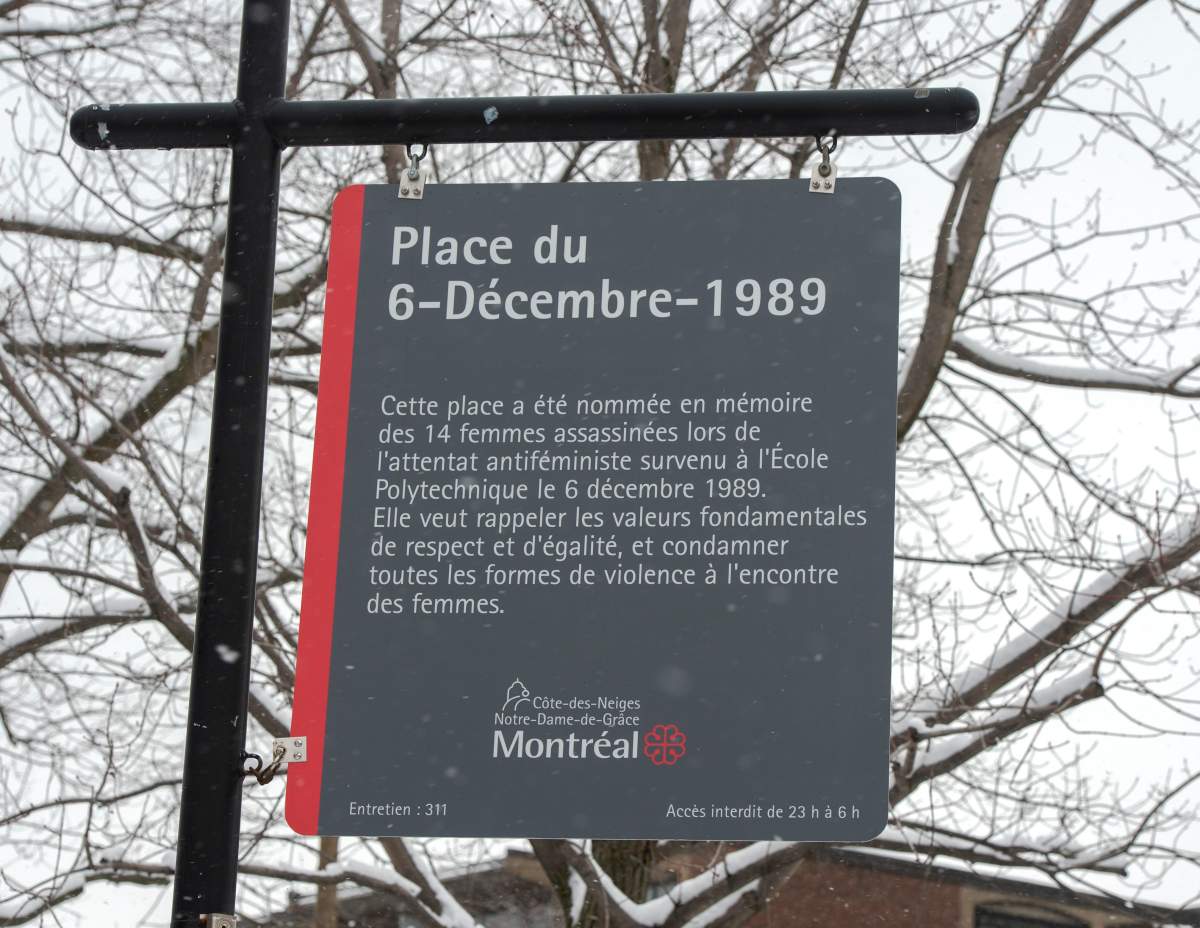A new plaque to commemorate the École Polytechnique massacre was unveiled on Thursday, identifying the event as an act of violence against women.

The event was previously referred to simply as a tragedy, without any mention of it having been a hate crime against women.
The new sign was unveiled at Place du 6-décembre-1989, a small memorial park in Montreal’s Côte-des-Neiges neighborhood. It was put in place just ahead of the mass shooting’s 30-year anniversary on Friday.
On Dec. 6, 1989, a gunman stormed the university just after 5 p.m. on a snowy Wednesday evening and killed 14 young women who were, for the most part, studying to become engineers. The gunman, who had set out to kill women only, then took his own life.
The attack at Polytechnique remains the deadliest shooting in Canada’s history.
The new plaque reads, in French:
“This park was named in the memory of the 14 women murdered during the anti-feminist attack that took place at École Polytechnique on December 6, 1989. It is a reminder of the fundamental values of respect and equality, and a condemnation of all forms of violence against women.”
Present at the sign’s unveiling on Thursday were Montreal Mayor Valérie Plante and Côte-des-Neiges–Notre-Dame-de-Grâce borough Mayor Sue Montgomery, among others.

Get breaking National news
“We want people walking through this place of memory to know the horrific truth,” Montgomery said.
“We should not be afraid to call acts of violence what they really are.”
Montgomery said that naming things for what they are is the first step in developing effective prevention mechanisms.
The borough mayor called the massacre an anti-feminist attack against not just women, but all people who work for equality.
Plante said that modifying the sign’s language to properly name the event for what it was is a significant step for a society to take to properly remember and reflect on the event.
She said it also highlights the importance of fighting against injustice and violence against women and girls.
“The sign now clearly explains why 14 young women, who had their entire lives ahead of them, lost them,” said the Montreal mayor.
“We finally found the word that was missing — femicide,” said Serge St-Arneault, whose sister, Annie St-Arneault, was killed in the mass shooting.
“It was women who were targeted.”
Annie was accompanied by 13 others, whose names are well known and are read out each year: Geneviève Bergeron, Hélène Colgan, Nathalie Croteau, Barbara Daigneault, Anne-Marie Edward, Maud Haviernick, Barbara Klucznik-Widajewicz, Maryse Laganière, Maryse Leclair, Anne-Marie Lemay, Sonia Pelletier, Michèle Richard and Annie Turcotte.
Thirty years later, what happened at Polytechnique continues to spark questions about violence against women and gun control.
For survivors and victims’ families, the fact that the weapon used in the mass killing has yet to be banned by Canadian authorities is difficult to fathom.
“It’s not easy, especially for the families, to keep fighting after 30 years, to keep facing the fact that the weapon that was used to kill their sisters and daughters is still legal and non-restricted,” said Heidi Rathjen, who was a Polytechnique student the night of the shooting and later became a staunch gun-control advocate.
The move to change the plaque’s text to specify the nature of the incident was initiated by professors Mélissa Blais and Diane Lamoureux from UQAM’s Réseau québécois en études féministes.
The families of the 14 victims were honoured at Quebec’s National Assembly on Thursday, with leaders condemning the misogynist violence and promising to never forget what happened on that evening in early December, 30 years ago.
A ceremony to honour the young women whose lives were taken will be held at 5 p.m. on Friday on Montreal’s Mont Royal.
— With files from Global News’ Kalina Laframboise and The Canadian Press





Comments
Want to discuss? Please read our Commenting Policy first.